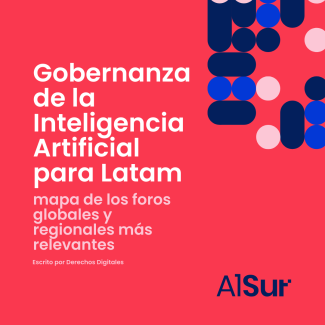AI Governance for Latam: Mapping the Most Relevant Global and Regional Forums (Part 2)
To have clarity on the relevant governance forums for Latin America, it must be said, in principle, that they are mostly facilitated by actors promoting the development agenda that seeks to prioritize the economic benefits stemming from the exploitation and production of AI systems with the aim of boosting the economy and labor market. Among these are the BRICS+, ECLAC, and the G20.
The BRICS+ is a group of developing countries seeking to counterbalance the G7 composed of Brazil, Russia, India, China, and South Africa, aiming to enhance cooperation among its members on AI matters and develop governance standards to "make AI technologies safer, reliable, controllable, and equitable." The composition of this group, its working agenda, or the mechanisms for involving various interested parties have not been defined yet, which is expected to happen soon.
The Economic Commission for Latin America and the Caribbean (ECLAC) established a working group for AI within the eLAC agenda in 2022. The group is coordinated by the National AI Center of Chile and the Electronic Government and Information Society Agency of Uruguay (AGESIC). For now, its emphasis is on enabling conditions for the development and use of AI in LAC countries. This environment involves the states as protagonists and seems to facilitate spaces for socializing the results of the group's work on AI with civil society, we'll see.
The G20 is a group of countries gathering the world's largest economies, including Brazil, Argentina, and Mexico in the region. It has an AI working group whose agenda focuses on development, capacity building, data governance, and infrastructure, among others. By 2024, the G20's work is focused on various dimensions of sustainable development (economy, society, environment) and global governance reform. It is expected that the developments of the AI working group will be discussed and adopted at the Summit to be held in November, where states, academia, civil society, among others, participate.
As a counterbalance to the agenda focused on economic development, the Organization of American States (OAS) has generated two related instances conducive to discussing the regulation or governance of AI. The first, resulting from the order issued in 2023 by the General Assembly, entrusts the Secretariat of the organization with delineating a Latin American agenda dedicated to addressing emerging technologies in digital governments; and the second, associated with the commitments agreed upon at the 2022 Summit of the Americas, which sets the goal for member states to promote ethical and responsible use of AI, as well as respect for human rights and inclusive development. In parallel, within the OAS framework, an ad hoc group was created to address data governance and AI, whose task is to advance inter-American guidelines in this matter.
In this regional agenda, the Intergovernmental Council for AI also joins, resulting from the First Ministerial and High-Level Authorities Summit on AI Ethics for Latin America and the Caribbean, promoted by the CAF, UNESCO1, and the government of Chile. Its objective is to create a regional position in the discussions on AI regulation and governance that will take place at the United Nations this year. It remains to be seen what spaces for participation and open discussion will be provided there, in a process that has so far been characterized more by its impenetrability.
Global Forums
On a global scale, the array of discussion forums on this topic is extensive2, but it is worth mentioning what is happening at the United Nations through the work of its Secretariat and the Special Envoy on Technology, tasked with centralizing and coordinating interested parties in three processes within the Global Digital Compact and the high-level advisory body for AI.
The Global Digital Compact (GDC) aims to define the agenda of principles for an open, free, and secure digital future, including discussions on global AI governance among its content. In fact, to advance a proposal agenda, the GDC led to the establishment of the High-Level Advisory Board on AI, HLab.
The advisory body's mission this year is to advance various recommendations for global AI governance. Its initial proposal, published at the end of 2023, will be refined in a final draft to be released in August 2024. It is expected that its work will serve as input for the creation of an international agency for AI governance.
Moreover, the Summit of the Future is a global event aiming to define operational strategies to address future challenges in 2024, including discussions on AI governance, of course. The agreements reached at the Summit will be captured in a Pact for the Future, the written agreement resulting from multiple discussions that will also address the future of AI
What to expect in the future
While the agendas of regional and global forums progress at varying paces and with objectives that sometimes overlap, we must not lose sight of legislative activity regarding AI in our countries. This activity is increasingly fast-paced and emerging not only in congresses or parliaments but also from various authorities and decision-makers: consumer protection and transparency authorities, the judiciary sector, among others.
It is in local-level legislative and public policy proposals that we can truly track and confirm the impact that the international agenda is having on approaches to AI regulation and governance. For example, we will need to see what impact the recent UN General Assembly Resolution on AI will have on multilateral regulation or governance, which, among other things, emphasizes the importance of advancing regulatory efforts with the participation of multiple stakeholders.
In the meantime, it is advisable to remain vigilant of the forums we have suggested here as the most relevant, and especially those others that are more critical and simultaneously take place away from public scrutiny.
1 UNESCO also plays a significant role both regionally and globally in promoting the adoption of its principles of ethics for AI. While we don't delve into its role here, we acknowledge that it is a relevant actor in the ecosystem of discussions on AI regulation and governance.
2 There's the 'Policy Network on AI' of the Internet Governance Forum; the AI Working Group of the Freedom Online Coalition; the various AI working groups of the OECD, among others like the Council of Europe - whose regulation in the digital ecosystem often resonates in LAC due to the 'Brussels effect'.



